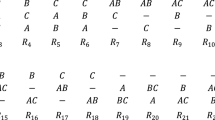Abstract
It is well known that a plurality election need not reflect the true sentiments of the electorate. Some of the proposed reform procedures, such as approval and cumulative voting, share the characteristics that there are several ways to tally each voter's preferences. Voting systems that permit truncated ballots share this feature. It is shown that the election results for any such procedure can be highly indeterminate; all possible election results can occur with the same choice of sincere voters. This conclusion of indeterminacy holds even when measures of voters' sentiments, such as the existence of a Condorcet winner or even much stronger measures, indicate there is considerable agreement among the voters. Then, multiple systems are compared with all standard tallying procedures. For instance, a corollary asserts it is probable for the plurality voting method to elect the Condorcet winner while approval voting has an indeterminate outcome.
Similar content being viewed by others
References
Brams, S., and Fishburn, P. (1982). Approval voting. Boston: Birkhauser.
Brams, S., and Fishburn, P. (1983). America's unfair elections. The Sciences (November). Reprinted in Eastern Airlines' Review Magazine (February 1984).
Brams, S., and Fishburn, P. (1984). Manipulability of voting by sincere truncation of preferences. Public Choice 44: 397–410.
Nagel, J. (1984). A debut for approval voting. PS 17 (Winter): 62–65.
Niemi, R. (1984). The problem of strategic behavior under approval voting. American Political Science Review 78: 952–958.
Saari, D.G. (1982). Inconsistencies of weighted voting systems. Mathematical of Operations Research 7: 479–490.
Saari, D.G. (1984). The ultimate of chaos resulting from weighted voting systems. Advances in Applied Mathematics 5: 286–308.
Saari, D.G. (1985). The optimal ranking method is the Borda Count. NU Discussion paper #636.
Saari, D.G. (1986). Susceptibility to manipulation. NU preprint, Sept. 1986.
Saari, D.G. (1987). The source of some paradoxes from social choice and probability. Journal of Economic Theory 41: 1–22.
Author information
Authors and Affiliations
Additional information
The work of both authors was supported, in part, by NSF Grant IST 8415348. This work was partially stimulated by comments concerning the assertions about approval voting and other systems that are discussed in (Saari, 1987). In particular, we are pleased to thank S. Brams, Carl Simon, and the other participants for their questions after one of us presented (Saari, 1987) at the July, 1984, ‘Workshop on Mathematical Models in Political Science’ held at the University of Minnesota in Minneapolis.
Rights and permissions
About this article
Cite this article
Saari, D.G., Van Newenhizen, J. The problem of indeterminacy in approval, multiple, and truncated voting systems. Public Choice 59, 101–120 (1988). https://doi.org/10.1007/BF00054447
Issue Date:
DOI: https://doi.org/10.1007/BF00054447




